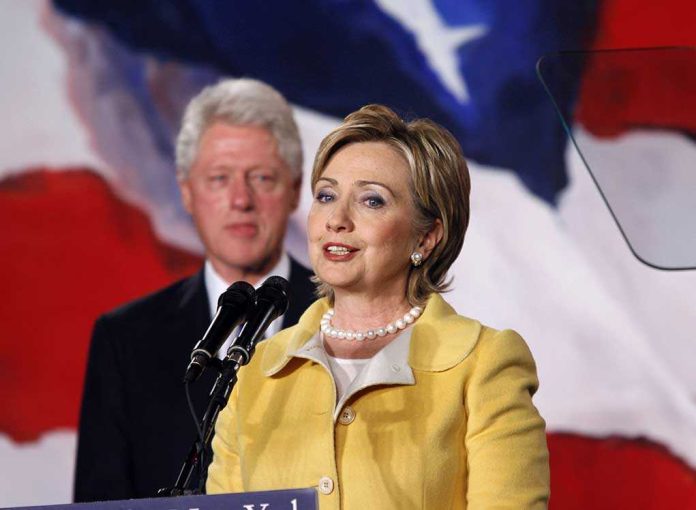
Congressional subpoenas targeting Bill and Hillary Clinton and top DOJ and FBI officials in the Epstein probe have shaken Washington, renewing demands for transparency and accountability at the highest levels of government.
Story Snapshot
- The House Oversight Committee issued subpoenas to Bill and Hillary Clinton, former Attorneys General, and FBI Directors for testimony on the handling of the Jeffrey Epstein case.
- The Department of Justice must release all Epstein-related materials by August 19, 2025, with a possible House vote on file declassification in September.
- Bipartisan frustration over the DOJ’s handling of Epstein, including the lack of a “client list,” drives the investigation.
- The move signals rare cross-party agreement for deep scrutiny of elite networks and government accountability.
Congressional Subpoenas Target Clinton, DOJ, and FBI in Epstein Investigation
On August 5, 2025, the House Oversight Committee took the unprecedented step of issuing subpoenas to former President Bill Clinton, former Secretary of State Hillary Clinton, and several high-ranking former DOJ and FBI officials. The subpoenas demand testimony and documents related to the federal government’s handling of the Jeffrey Epstein case, a scandal that has symbolized elite impunity and government secrecy for years. The Department of Justice now faces a strict deadline of August 19 to turn over all Epstein-related materials, as public distrust and bipartisan outrage mount over past failures to bring the full truth to light.
Chairman James Comer (R-KY) and the Oversight Committee made clear that this is not business as usual. The committee’s actions follow a July 23 unanimous subcommittee vote authorizing subpoenas for depositions from Bill Clinton and others. The investigation’s scope is sweeping: subpoenas have also been delivered to former Attorneys General Merrick Garland, Bill Barr, Alberto Gonzales, Jeff Sessions, Loretta Lynch, and Eric Holder, as well as former FBI Directors James Comey and Robert Mueller. This broad net reflects the committee’s intent to examine years of institutional decision-making that kept much of the Epstein case in the shadows. The bipartisan nature of this push underlines the urgency felt on both sides of the aisle to address public concerns and government accountability.
Public Frustration Fuels Calls for Transparency
The Epstein case has been a lightning rod for public frustration with government overreach, elite privilege, and the erosion of trust in our institutions. After Epstein’s 2019 arrest and subsequent death in federal custody—officially ruled a suicide—public skepticism exploded, fueled by the DOJ’s recent conclusion that there is no “client list” and no further criminal liability for powerful associates. Many Americans have watched with growing anger as the case was closed without real answers, suspecting a system rigged to protect the well-connected. The Oversight Committee’s latest move signals that these concerns are finally being addressed at the congressional level, providing a rare moment of unity for citizens demanding truth and justice.
Transparency advocates and survivors’ groups have applauded the subpoenas, arguing that they are long overdue. The committee has also ordered the DOJ to produce all Epstein-related documents by August 19, setting the stage for a possible House vote in September on declassifying the files if enough signatures are gathered. Speaker Mike Johnson has echoed these calls, stating that House Republicans have “no fear” in pursuing the truth, regardless of where it leads. The bipartisan consensus reflects a shared desire to root out systemic failures and restore faith in the rule of law.
Bipartisan Action and High Stakes for Institutions
This investigation stands out not only for its high-profile targets but also for its rare bipartisan character. Lawmakers from both parties, including Reps. Nancy Mace, Scott Perry, Brian Jack, Thomas Massie, and Ro Khanna, support the subpoenas and demands for declassification. Their unified stance sends a powerful message: the American people deserve answers, and no one is above congressional scrutiny. Legal experts note the significance of congressional oversight on sensitive criminal matters, pointing out that past failures—like the controversial 2008 Epstein plea deal—have eroded public confidence in the justice system. The current probe could set a precedent for how Congress addresses elite accountability and protects victims’ rights in future cases.
Subpoenaed officials, including the Clintons, may seek to defend their actions and reputations, but the stakes are clear. The investigation could lead to legislative reforms on sex trafficking laws and prosecutorial agreements, impacting how future cases are handled. It also puts pressure on the DOJ and FBI to cooperate fully with Congress, as any resistance could be viewed as a further attempt to shield the powerful from scrutiny. The coming weeks will determine whether the House can secure the necessary votes to declassify the long-hidden Epstein files, potentially opening a new chapter in the fight for government transparency and justice for victims.
Broader Implications: Restoring Trust and Upholding Values
The outcome of this investigation will resonate far beyond Capitol Hill. For years, Americans have watched as the political elite seemingly operated under a different set of rules, fueling cynicism and distrust. The current effort by the House Oversight Committee, especially with bipartisan backing, offers a chance to restore faith in constitutional oversight and equal justice under the law. If successful, it could reinforce the principle that even the most powerful must answer for their actions when the public interest, family values, and the safety of children are at stake. The investigation’s progress will be closely watched by survivors, advocates, and all Americans who demand that government serve the people, not the privileged few.
Sources:
House Oversight Committee subpoenas Clintons, former DOJ and FBI officials in Epstein probe
Official Subpoena Cover Letters – House Oversight Committee
House Oversight subpoenas DOJ, Clintons, Comey in Epstein probe
House Oversight Committee issues subpoenas for Epstein files
Chairman Comer Subpoenas Bill and Hillary Clinton, Former U.S. Attorneys General and FBI Directors









